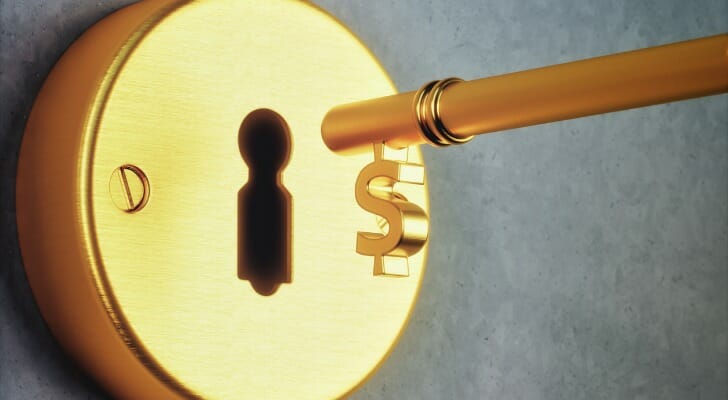A mortgage rate lock allows you to “lock in” an interest rate on a mortgage, protecting you from potential interest rate spikes. While this can be a great tool to help you save money, it may not always work for your unique situation. Knowing how mortgage rate locks work will aid you greatly when deciding whether or not to get your own. Consider working with a financial advisor as you consider how purchase a home within the context of your long-term financial plan.
What Is a Mortgage Rate Lock?
A mortgage rate lock, also referred to as rate protection, is a guarantee from your home loan lender. It ensures that your mortgage interest rate won’t rise for a specified period, which is the time between applying for and closing on your loan. However, you can pay for an extension if you are borrowing to fund a construction project.
Some mortgage rate locks include a “float-down” option. With a float-down option, you can lower your interest after you have already locked in your rate. However, this usually comes at an additional fee.
A mortgage rate lock is binding for both the lender and the borrower for the duration of the rate lock agreement. One of the only things that may impact a rate’s consistency is if there are changes to your loan application before closing. You may receive a different interest rate if your credit score, income, loan type or loan amount changes. A lower-than-expected or higher-than-expected home appraisal can affect your loan rate as well.
Once you have your rate lock, though, one of three situations occur:
- Rates go up: This is the ideal situation. Your rate lock protects you from rate increases, saving you money.
- Rates go down: Unfortunately, this means you lose out on a more competitive rate. You have to pay the higher, previous rate.
- Rates stay the same: Rate locks are a protection against market changes. But they are only insurance against potential fluctuations. Since the market can be unpredictable, there is the possibility that rates stay the same. However, it may still give you peace of mind to pay for a rate lock.
Your home loan lender will likely offer you a rate lock once they approve your loan application. You can expect that specific policies vary between lenders. But even if your lender doesn’t bring up a rate lock before the underwriting process, you can still ask about one. They will likely discuss their offered rate lock periods and the associated fee at that point. You can also try to negotiate with lender on their terms.
When Do You Need a Mortgage Rate Lock?
Finding the right time for a mortgage rate lock takes some consideration. You should think about locking your rate if you get approval for a mortgage at a competitive interest rate. That may not necessarily be the lowest rate possible. However, it should result in monthly payments you can afford without hurting your budget.
Exact timing can be difficult, though. The housing market and mortgage rates can fluctuate day to day. So, it might be helpful to focus on getting the best rate you can earn rather than waiting for the perfect drop in rates.
Since a mortgage rate requires a definite timeline, it may work best if you have a schedule to follow. For instance, it may be easier to choose a rate lock period if you have a firm closing date, the home doesn’t need repairs or you’re ready to move in.
Mortgage Rate Lock Costs and Durations

The timespan of a mortgage rate locks vary. In addition, their offer will likely depend on the type of loan you want, the loan terms and where you live. However, you can typically lock in your rate anywhere between 30 to 60 days (or more in some cases).
Generally speaking, the longer a rate lock lasts, the more expensive the fee. For some, a longer period may be justified, like when borrowing to pay for a construction project. But that may not be the case for you. So, carefully consider the time you need to complete the underwriting and closing processes. You should also make sure to budget time for any potential issues or hurdles.
Some lenders claim their mortgage rate lock is “free,” meaning they covered the cost somewhere else in their offer. For example, they may have included it directly in your interest rate. Meanwhile, others will charge you a fee for one.
The exact cost of your fee will depend on various factors, like your lender, your loan amount, your loan term and the length of your lock-in period. Generally, short-term loan rate locks (under 60 days) are either free or cost approximately 0.25% to 0.50% of the total loan amount.
Do You Need a Mortgage Rate Lock?
A mortgage rate lock can save you money in the scenario that rates increase. However, getting a good deal on your loan is a secondary benefit. The primary reason you should consider a rate lock is the security it provides. By paying for one, you protect your home buying power. After all, even a slight increase in your mortgage rate can result in thousands of dollars in difference. Rates can easily increase during the weeks it may take to enter a contract and close on it.
While locking your rate can be financially beneficial, consider consulting your mortgage lender first. Again, there may be some charges associated with this move. You should know how those fees break down before signing up for them.
Bottom Line

If you have an advantageous mortgage rate available to you, it may be worthwhile to lock it in. But of course, you can always do some research beforehand. For example, consider asking your loan advisor for any input. You can also look at the most recent mortgage rates in your area and for your credit score to see how your offer compares. In addition, communicate with your lender. If you see your closing process getting drawn out, talk to your lender about an extension. You should do this in advance before the lock’s expiration.
Tips to Save for a Home
- Don’t know where to start looking for a mortgage? Use SmartAsset’s mortgage rate comparison tool to browse mortgage rates from top lenders.
- A mortgage rate lock is just one consideration for home buyers. You must make multiple decisions during the property buying process that can impact your financial plan. Because of that, it may be wise to speak with a financial advisor beforehand. Finding a qualified financial advisor doesn’t have to be hard. SmartAsset’s free tool matches you with up to three financial advisors who serve your area, and you can interview your advisor matches at no cost to decide which one is right for you. If you’re ready to find an advisor who can help you achieve your financial goals, get started now.
Photo credit: ©iStock.com/FG Trade, ©iStock.com/Edwin Tan, ©iStock.com/imaginima
